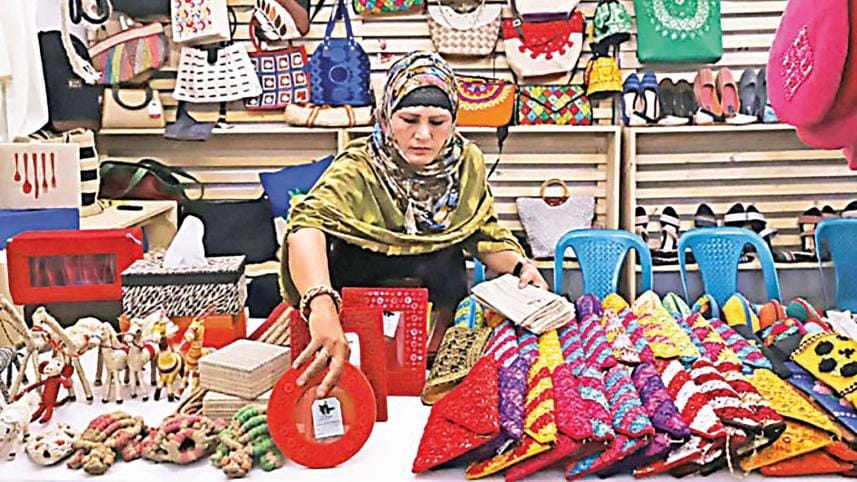Is the SME sector adequately women-friendly?

"I had to let go of many employees, close down shops, and shift to mostly online deliveries," shares Ashna Afroze, CEO and Founder of Prakriti Farming, when speaking about the initial hit faced by her small and medium-sized enterprise (SME) during the COVID-19 pandemic. Starting with just one employee in 2016, Ashna Afroze created a network of organic urban farmers to deliver uncontaminated produce to people. Although Prakriti Farming could adapt to the "new normal" enforced by the pandemic, the same can't be said for many other women-led SMEs.
A study on women entrepreneurs in South Asia by The Asia Foundation found that 75 percent of respondents did not have the financing to adapt to restrictions imposed by the pandemic. "Women entrepreneurs have small levels of capital to begin with. Pandemic restrictions caused markets to shut down and disrupted the supply chain. Consequently, entrepreneurs had to halt businesses for a while and could not sell their stocks before they were ruined. Having no more capital to invest, many businesses shut down permanently," says Sadia Afroze Sultana, Senior Programme Manager, The Asia Foundation. The reality of SMEs bearing the brunt of the pandemic is further shared by Sazia Tasnim, Co-Founder of Selvice, an e-commerce platform for event-related logistics: "During the pandemic, many service providers shut down, and our supply chain was disrupted. There were commute problems as well, leading to quality check issues."
According to the Economic Census of 2013, 7.2 percent of all enterprises in Bangladesh are led by women. Of these, 99 percent are SMEs. The SME sector contributes to 25 percent of our total GDP, which means supporting women SME entrepreneurs is crucial to the country's economic growth. Still, there are countless hurdles for women SME entrepreneurs. "Women entrepreneurs face challenges from three dimensions: household, social and institutional. At the household level, families are reluctant to give women capital to start their businesses, fearing that after marriage, the benefits of the capital investment will not be enjoyed by the women," says Dr Nazneen Ahmed, Senior Research Fellow, Bangladesh Institute of Development Studies (BIDS).
Only 36 percent out of all eligible women participate in the labour market in Bangladesh. The proportion of women entrepreneurs is quite low, as they face a lack of access to the market since women-friendly facilities are not available. "They also have a lack of support from society and face mobility restrictions. Society segments which areas of entrepreneurship can be for men and which for women, reinforcing gender stereotypes," adds Dr Nazneen Ahmed. Shifting to e-commerce is commonly cited as a solution to mobility issues of women entrepreneurs. However, promoting e-commerce platforms solely for women further strengthens the harmful social norm that women cannot go to the same areas as men. This notion also ignores the need for more security and safer transport for women entrepreneurs.
At the institutional level, women entrepreneurs mostly face a capital constraint. Under the Refinance Scheme of Bangladesh Bank, commercial banks provide low-cost loans to SME entrepreneurs. 15 percent of these loans are reserved for women SME entrepreneurs. "Banks tend to provide large-scale loans; even if they provide SME loans, those mostly go to men because they do not trust potential women entrepreneurs. Women also find it difficult to find multiple guarantors, as demanded by banks," says Dr Nazneed Ahmed. Innovative financial products that help women get smaller loans, cluster-based loan programmes, and heavier monitoring by banks of the SME loan programmes are solutions to these issues.
To relieve some of the setbacks caused by the pandemic, the government had allocated 20,000 crore taka for stimulus packages for women entrepreneurs in 2020, with another package worth 1,500 crore taka allotted in January 2021. However, women entrepreneurs barely have access to these packages. "The mechanism for disbursement of SME stimulus packages needs to change. Banks cannot have the same criteria for these packages as regular loans," opines Farzana Khan, General Manager, Women Entrepreneurship Development, Technology Development, Capacity Development and Cluster Development wing, SME Foundation.
While some positive strides have been made in supporting women-led SMEs, we still have a long way to go. Farzana Khan sheds light on one critical aspect to remember during the process of making the SME sector more women-friendly: "'Helping women entrepreneurs' can't be made into mere buzzwords; tangible steps have to be taken to support them."



 For all latest news, follow The Daily Star's Google News channel.
For all latest news, follow The Daily Star's Google News channel.
Comments